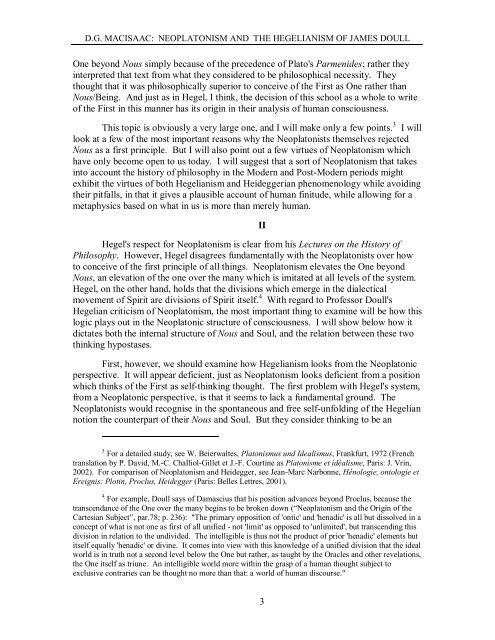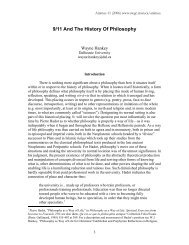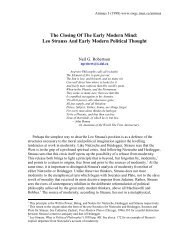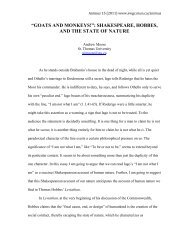Neoplatonism And The Hegelianism Of James Doull1
Neoplatonism And The Hegelianism Of James Doull1
Neoplatonism And The Hegelianism Of James Doull1
You also want an ePaper? Increase the reach of your titles
YUMPU automatically turns print PDFs into web optimized ePapers that Google loves.
D.G. MACISAAC: NEOPLATONISM AND THE HEGELIANISM OF JAMES DOULLOne beyond Nous simply because of the precedence of Plato's Parmenides; rather theyinterpreted that text from what they considered to be philosophical necessity. <strong>The</strong>ythought that it was philosophically superior to conceive of the First as One rather thanNous/Being. <strong>And</strong> just as in Hegel, I think, the decision of this school as a whole to writeof the First in this manner has its origin in their analysis of human consciousness.This topic is obviously a very large one, and I will make only a few points. 3 I willlook at a few of the most important reasons why the Neoplatonists themselves rejectedNous as a first principle. But I will also point out a few virtues of <strong>Neoplatonism</strong> whichhave only become open to us today. I will suggest that a sort of <strong>Neoplatonism</strong> that takesinto account the history of philosophy in the Modern and Post-Modern periods mightexhibit the virtues of both <strong>Hegelianism</strong> and Heideggerian phenomenology while avoidingtheir pitfalls, in that it gives a plausible account of human finitude, while allowing for ametaphysics based on what in us is more than merely human.Hegel's respect for <strong>Neoplatonism</strong> is clear from his Lectures on the History ofPhilosophy. However, Hegel disagrees fundamentally with the Neoplatonists over howto conceive of the first principle of all things. <strong>Neoplatonism</strong> elevates the One beyondNous, an elevation of the one over the many which is imitated at all levels of the system.Hegel, on the other hand, holds that the divisions which emerge in the dialecticalmovement of Spirit are divisions of Spirit itself. 4 With regard to Professor Doull'sHegelian criticism of <strong>Neoplatonism</strong>, the most important thing to examine will be how thislogic plays out in the Neoplatonic structure of consciousness. I will show below how itdictates both the internal structure of Nous and Soul, and the relation between these twothinking hypostases.First, however, we should examine how <strong>Hegelianism</strong> looks from the Neoplatonicperspective. It will appear deficient, just as <strong>Neoplatonism</strong> looks deficient from a positionwhich thinks of the First as self-thinking thought. <strong>The</strong> first problem with Hegel's system,from a Neoplatonic perspective, is that it seems to lack a fundamental ground. <strong>The</strong>Neoplatonists would recognise in the spontaneous and free self-unfolding of the Hegeliannotion the counterpart of their Nous and Soul. But they consider thinking to be anII3 For a detailed study, see W. Beierwaltes, Platonismus und Idealismus, Frankfurt, 1972 (Frenchtranslation by P. David, M.-C. Challiol-Gillet et J.-F. Courtine as Platonisme et idéalisme, Paris: J. Vrin,2002). For comparison of <strong>Neoplatonism</strong> and Heidegger, see Jean-Marc Narbonne, Hénologie, ontologie etEreignis: Plotin, Proclus, Heidegger (Paris: Belles Lettres, 2001).4 For example, Doull says of Damascius that his position advances beyond Proclus, because thetranscendance of the One over the many begins to be broken down (“<strong>Neoplatonism</strong> and the Origin of theCartesian Subject”, par.78; p. 236): "<strong>The</strong> primary opposition of 'ontic' and 'henadic' is all but dissolved in aconcept of what is not one as first of all unified - not 'limit' as opposed to 'unlimited', but transcending thisdivision in relation to the undivided. <strong>The</strong> intelligible is thus not the product of prior 'henadic' elements butitself equally 'henadic' or divine. It comes into view with this knowledge of a unified division that the idealworld is in truth not a second level below the One but rather, as taught by the Oracles and other revelations,the One itself as triune. An intelligible world more within the grasp of a human thought subject toexclusive contraries can be thought no more than that: a world of human discourse."3
















